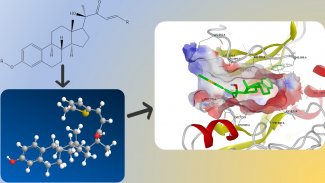Overview of Research

- Design and synthesis of cancer chemotherapeutics targeting liver, lung, colon, pancreas, prostate, ovarian and cervical, and breast cancer
- Potential drug candidate studies targeting kinase and phosphatase inhibitors.
- Molecular docking and molecular dynamic simulation studies for guided structure design.
- Bioassay-guided separation, structure elucidation, synthesis and biotransformation of potential drug candidates.
- Drug Development and nutraceutical standardization of Native Americans medicine.
- Extraction and quantification of natural products from naturally occurring sources.
Current Projects
Design and synthesis of C-11 substituted estrone analogs for treatment in pancreatic cancer
Pancreatic cancer remains one of the deadliest cancers particularly due to its sudden onset, fast progression, and lack of a reliable treatment option. Recent studies from our laboratory have determined that substitution of estrone analogs at their C-11 position provides increased cytotoxicity towards both 2-dimensional and 3-dimensional cell cultures in-vitro. Recent work has focused on analogs with oxygenated and nitrogenous functionality.
Design and synthesis of fluorine-substituted aromatic estrone analogs for prostate cancer
Prostate cancer remains one of the most deadliest among men, with drug resistance to therapeutic being common. Current work in our laboratory details the substitution of aromatic steroids with fluorine atoms to increase binding to kinases involved in cell survival, namely the Epidermal Growth Factor Receptor (EGFR) pathway. Synthesis of first-round analogs is currently being investigated
Synthetic optimization for substituted C23-C24 enone analogs for use in hepatocellular carcinoma
A large number of studies have been performed in our laboratory (See recent publications) regarding the use of estrone analogs in hepatocellular carcinoma (HCC). These analogs possess a potential flaw in that they exhibit the ability to act as Michael Acceptors for conjugation addition. This could lead to fast metabolism and removal from the body, and as such is being investigated by exploring the ability to substitute the enone system with fluorine and nitrile functionalization. Synthetic optimization is currently being investigated.
Design and synthesis of C17-amino acid analogs for treatment in pancreatic cancer
With our recent success in developing C-11 amino analogs, we have begun work on functionalizing these groups on our steroid core at the C-17 position, a key location for bioactivity. Current work details installation of various amino acid functional groups to this amine to mimic a "protein conjugate" in hopes for increased bioactivity. Molecular modeling studies have suggested these analogs show improvement over previously synthesized analogs, and their synthesis is currently being performed.
Biological screening of triazole-estradiol analogs in triple negative breast cancer and hepatocellular carcinoma
One set of compounds we have previously created, our triazole-estradiol analogs, showed the ability to revert drug resistance in ovarian and colorectal cancer cells by inhibition of key EGFR pathway proteins. This work details the use of these analogs, as well as second generation analogs, in other cancers such as triple negative breast cancer and hepatocellular carcinoma. Current work is being performed to study the biological effects of these analogs in both cancers.
Determination and Quantification of natural products in plant materials
Current work in our laboratory has also been investigating the roles of various plant metabolites in protecting the plant from environmental damages. Two projects in collaboration with other sites have detailed the extraction, isolation, determination, and quantification of these plant metabolites from natural sources using High Performance Liquid Chromatography systems.

